Discover the Ancient Wonders of Yunju Temple and Stone Sutras
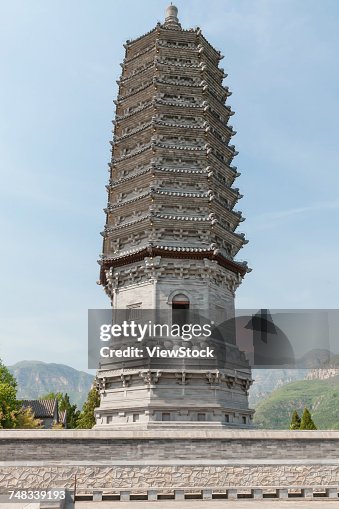
An Essential Guide to Visiting Yunju_Temple_And_Stone_Sutras
Nestled in the tranquil hills of Beijing’s Fangshan District, the Yunju Temple and Stone Sutras stand as a testament to China’s rich Buddhist heritage. This ancient site, often referred to as “the Northern Giant Pagoda,” offers visitors a unique glimpse into the profound depths of Buddhist culture, history, and artistry. With roots dating back to the Sui and Tang Dynasties, Yunju Temple is not only a spiritual sanctuary but also a treasure trove of exquisite craftsmanship and historical significance.
The temple complex is renowned for its remarkable collection of stone sutras—some of the oldest and most complete in the world—carved from stone slabs over a millennium ago. These sacred texts, along with the temple’s stunning architecture, including multiple pagodas and halls, create a serene atmosphere that invites reflection and exploration.
As you wander through the temple’s five courtyards and six halls, each step reveals intricate carvings and the peaceful sounds of nature, offering a moment of respite from the bustle of modern life. Whether you’re an avid historian, a spiritual seeker, or simply a traveler in search of beauty, Yunju Temple and its Stone Sutras promise an enriching experience that connects you with the past.
Prepare to embark on a journey through time, where the whispers of ancient monks and the scent of sandalwood linger in the air, guiding you toward a deeper understanding of faith, culture, and the artistry of stone. Your adventure at Yunju Temple awaits, beckoning you to discover its secrets and share in its enduring legacy.
In This Guide
- An Essential Guide to Visiting Yunju_Temple_And_Stone_Sutras
- The Rich History and Legends of Yunju_Temple_And_Stone_Sutras
- Main Highlights: What You Absolutely Can’t Miss
- Planning Your Visit: A Practical Guide
- Tickets: Prices, Booking, and Tips
- How to Get There: A Complete Transportation Guide
- Local Cuisine and Accommodation Nearby
- Frequently Asked Questions
- Final Thoughts on Your Trip
The Rich History and Legends of Yunju_Temple_And_Stone_Sutras
Nestled in the serene mountains of Fangshan District, about 70 kilometers southwest of Beijing’s bustling heart, Yunju Temple, or Yunju Si, is a treasure trove of history and spiritual significance. Founded during the transitional period of the Sui and Tang dynasties, this ancient temple complex, originally named Zhiquan Temple, has weathered the winds of time, enduring destruction and restoration, to emerge as a beacon of Buddhist culture and heritage.
The temple’s architectural grandeur unfolds across five courtyards and six main halls, each radiating a sense of calm and reverence. The layout is unique, with the temple orienting westward—a rarity among Chinese temples that typically face south. This distinctive arrangement enhances its spiritual ambiance, inviting visitors to delve into its profound history. The monastery boasts impressive features such as the magnificent North and South Pagodas, which stand as sentinels of the past.
The North Pagoda, also known as the Luohan Pagoda, dates back to the Liao dynasty (1117-1120) and is celebrated for its intricate brickwork and architectural style, merging elements of a pavilion, stupa, and the iconic ‘Vajra’ seat. Meanwhile, the South Pagoda was reconstructed after suffering destruction during the Second Sino-Japanese War. Together, these pagodas reflect the artistic and spiritual legacy of Buddhist architecture in China.
One of the most remarkable aspects of Yunju Temple is its collection of stone sutras. The temple houses over 14,000 stone tablets inscribed with Buddhist texts, an endeavor that began in the Sui dynasty and continued through the Tang, Liao, Jin, Yuan, and Ming dynasties. This monumental undertaking, known as the “Stone Sutras,” is recognized as a UNESCO World Heritage prelist site and is often referred to as “Beijing’s Dunhuang.” This vast repository of religious texts not only serves as a crucial resource for Buddhist studies but also provides insight into the evolution of Chinese calligraphy and art over the centuries.
Of particular note is the remarkable “Blood-Stained Sutra,” a unique piece crafted by a monk who inscribed the text using his own blood, symbolizing his deep devotion and sacrifice. Such stories resonate within the temple’s walls, drawing visitors into a narrative of faith, resilience, and artistic achievement.
Yunju Temple has endured significant adversities, notably being largely destroyed by Japanese artillery during World War II. However, through subsequent restoration efforts, the temple has been revitalized, allowing it to reclaim its status as a significant cultural and spiritual site. The temple grounds now serve not only as a place of worship but also as a vibrant community space, hosting cultural events and exhibitions that celebrate its rich heritage.
Visitors to Yunju Temple can embark on a journey through history, exploring the intricacies of ancient Buddhist practices while immersing themselves in the tranquil beauty of the surrounding landscape. The temple’s serene environment and storied past offer an enchanting glimpse into the spiritual and cultural tapestry of China, making it a must-visit destination for international travelers seeking a deeper understanding of the region’s Buddhist traditions.
In essence, Yunju Temple and its Stone Sutras encapsulate a rich history, marked by legends of devotion and resilience, making it a remarkable testament to China’s enduring spiritual heritage.
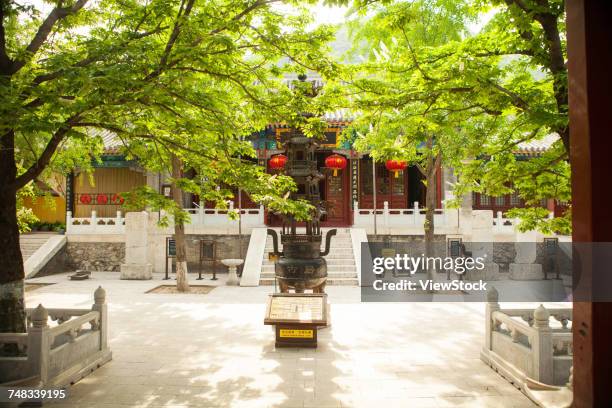
Yunju_Temple_And_Stone_Sutras.
Main Highlights: What You Absolutely Can’t Miss
When visiting Yunju Temple and the Stone Sutras, you’re stepping into a realm where history, culture, and spirituality converge. This remarkable site, located about 70 kilometers southwest of Beijing, is not just a temple; it’s a treasure trove of Buddhist heritage. Here are the main highlights that you absolutely can’t miss during your visit:
1. The Architectural Marvel of Yunju Temple
Established during the Sui Dynasty and expanded in the Tang Dynasty, Yunju Temple is a stunning representation of ancient Chinese architecture. The temple is laid out in a unique west-to-east orientation, which is quite rare among Chinese temples. Explore the five main courtyards and six main halls that harmoniously blend with the mountainous landscape, creating a serene atmosphere perfect for reflection and meditation.
2. The Stone Sutras
Yunju Temple is renowned for its “Three Treasures”: the Stone Sutras, the Paper Sutras, and the Wooden Sutras. The Stone Sutras are particularly significant; they comprise a collection of over 14,000 stone tablets inscribed with Buddhist scriptures, carved over a span of more than a thousand years. This collection offers a profound insight into the evolution of Buddhist thought and Chinese calligraphy, making it a must-see for both history buffs and spiritual seekers.
3. The Southern and Northern Pagodas
The temple complex features two iconic pagodas: the Southern Pagoda, also known as the Cangjing Pagoda, is a striking eleven-story structure that houses ancient Buddhist relics. The Northern Pagoda, or Luohan Pagoda, dating back to the Liao Dynasty, stands tall at over 30 meters and showcases a blend of architectural styles. These pagodas are not only architectural feats but also serve as historical markers of the region’s rich Buddhist past.
4. The Cangjing Cave
Adjacent to the temple is the impressive Cangjing Cave on Stone Sutra Mountain. This cave contains nine chambers, eight of which are closed to the public, but the largest one, known as Leiyin Cave, is open for exploration. Inside, you’ll find remarkable stone carvings and an array of ancient scriptures that reflect the artistic and spiritual devotion of the period.
5. Cultural Exhibits and Artifacts
Don’t miss the “Yunju Xiezhen” exhibition, which showcases a collection of ancient artifacts, including intricately carved wooden panels and exquisite examples of Buddhist art. The exhibition provides a deep dive into the cultural and artistic legacy of the temple, allowing visitors to appreciate the craftsmanship of bygone eras.
6. Stunning Natural Scenery
Yunju Temple is not just about ancient architecture and artifacts; it’s also surrounded by breathtaking natural landscapes. As you wander through the temple grounds, take a moment to appreciate the serene mountain views, tranquil pathways, and the lush greenery that envelops the area. The combination of natural beauty and spiritual ambiance creates a peaceful retreat from the hustle and bustle of urban life.
7. Cultural Market Nearby
After exploring the temple, consider visiting the nearby cultural market, where artisans showcase traditional crafts and local delicacies. This vibrant market is a perfect spot to pick up unique souvenirs, enjoy local snacks, and immerse yourself in the local culture.
Practical Information
- Opening Hours: The temple is open from 9:00 AM to 5:00 PM, with the last entry at 4:30 PM.
- Admission Fee: The entrance ticket is approximately 40 yuan, with discounts available for seniors and children.
- Getting There: Accessible via public transport or a one-hour drive from downtown Beijing, the temple is well-connected for visitors.
Whether you’re drawn by the allure of ancient scriptures, the beauty of traditional architecture, or the tranquility of nature, Yunju Temple and the Stone Sutras offer an unforgettable experience that resonates with both the mind and spirit. Prepare for a journey that blends history, culture, and spirituality in one of China’s most cherished Buddhist sites.
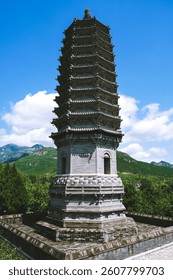
Yunju_Temple_And_Stone_Sutras.
Planning Your Visit: A Practical Guide
Visiting Yunju Temple and Stone Sutras offers an immersive glimpse into China’s rich Buddhist heritage and architectural grandeur. Situated in the serene countryside of Beijing’s Fangshan District, this site is a must-visit for international travelers eager to explore historical treasures.
Getting There
Location: Yunju Temple is located approximately 70 kilometers southwest of Beijing’s city center, nestled in the picturesque Shuitou Village, Dashiwo Town, Fangshan District.
Transportation Options:
- By Car: The drive takes about 1.5 hours. Navigate via the Jingcheng Expressway (京石高速), take the exit at Liulihe, and follow the signs to Yunju Temple.
- Public Transport:
- From Liuliqiao East Station, take bus 917 to Shiwokou Station, then transfer to bus F31 to reach Yunju Temple.
- Alternatively, you can catch a train from Beijing South Station to Yunju Temple Station, which takes around 30 minutes. However, note that the train runs only once daily.
Admission Information
Ticket Price:
– Adults: 40 CNY (~$6 USD)
– Seniors (60+ years): Free admission
– Children (under 18): Free admission
Opening Hours:
– Summer (April to October): 8:30 AM – 4:30 PM
– Winter (November to March): 9:00 AM – 4:00 PM
– Last entry is 30 minutes before closing.
What to See
Yunju Temple is renowned for its stunning architecture and significant cultural relics, including:
-
The Temple Complex: Comprising five courtyards and six main halls, the temple showcases a harmonious blend of ancient Buddhist architecture with serene surroundings. The main halls include the Hall of the Great Hero, the Hall of Medicine Buddha, and the Hall of Amitabha.
-
Stone Sutras: The site is famous for its impressive collection of stone-carved Buddhist scriptures, which are regarded as one of the world’s most significant repositories of Buddhist literature. The stone sutras date back to the Sui and Tang dynasties and provide a rich historical context for visitors.
-
Pagodas: The temple is flanked by two striking pagodas— the North Pagoda (Lao Han Pagoda) and the South Pagoda (Cangjing Pagoda). The North Pagoda, built during the Liao Dynasty, is especially notable for its unique architectural style.
-
Cave of the Sutras (藏经洞): A short hike up Stone Sutra Mountain reveals nine caves, with the largest, known as Leiyin Cave, open to the public. This cave houses intricate stone carvings and scriptures, offering a glimpse into the art and spirituality of the time.
Tips for Your Visit
- Stay Hydrated: Be sure to bring water, especially if you plan on hiking up to the caves.
- Dress Appropriately: Comfortable footwear is recommended, as exploring the temple and surrounding areas involves walking and possibly some climbing.
- Respect the Culture: As a place of worship, maintain a respectful demeanor, especially in the temple halls and during any ceremonies you may witness.
- Photography: While photography is allowed in most areas, refrain from using flash inside the temple to avoid disturbing the serene atmosphere.
Nearby Attractions
After exploring Yunju Temple, consider visiting nearby attractions:
- Shidu Scenic Area: Known for its stunning natural landscapes and opportunities for outdoor activities such as hiking and rock climbing.
- Cultural Markets: Engage with local artisans and purchase unique handicrafts, further enriching your cultural experience.
Where to Stay
For those wishing to extend their stay, consider local accommodations such as private hot spring lodges or boutique hotels that offer a peaceful retreat amidst nature. The Reindeer Bay Private Hot Spring Lodge, located just 320 meters from the temple, provides a tranquil escape with its tropical-style decor and private hot spring facilities.
Conclusion
Yunju Temple and Stone Sutras not only offer a profound insight into Buddhist history but also provide a tranquil setting for reflection and exploration. Whether you’re a history enthusiast, a spiritual seeker, or simply a traveler looking for serene landscapes, this site promises an unforgettable experience.
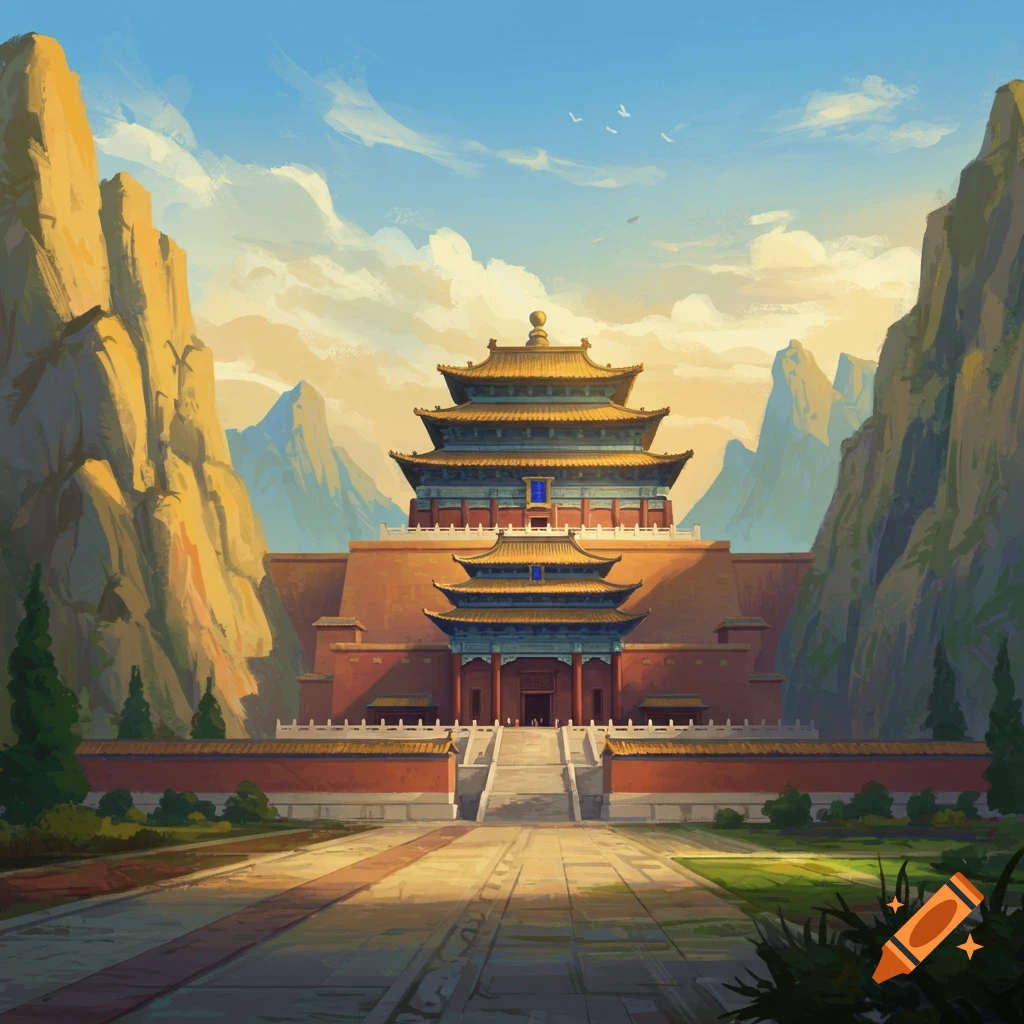
Yunju_Temple_And_Stone_Sutras.
Tickets: Prices, Booking, and Tips
When planning your visit to the Yunju Temple and Stone Sutras, it’s essential to know the ticketing information to ensure a smooth experience. The temple is a significant cultural and historical site located approximately 70 kilometers southwest of Beijing, within a serene mountainous landscape that offers a glimpse into ancient Buddhist traditions.
Ticket Prices
- General Admission: CNY 40 (approximately HKD 44)
- Free Entry:
- Children under 18 years old
- Seniors aged 60 and above (with valid ID)
Booking Information
Tickets can be conveniently booked online. Many platforms offer instant cancellation options, allowing flexibility in your travel plans. It’s recommended to book in advance, especially during peak tourist seasons.
Visiting Hours
Yunju Temple is open to visitors year-round, though hours may vary slightly by season:
– Winter: 9:00 AM to 4:00 PM (last admission at 3:30 PM)
– Summer: 8:30 AM to 4:30 PM (last admission at 4:00 PM)
Tips for Visitors
- Arrive Early: To fully explore the expansive grounds and appreciate the serene environment, aim to arrive when the temple opens.
- Respectful Attire: As a religious site, it’s advisable to dress modestly and adhere to any specific guidelines the temple may have regarding behavior and photography.
- Guided Tours: Consider joining a guided tour to enrich your understanding of the temple’s history and the significance of the stone sutras.
- Explore Nearby Attractions: The temple is in proximity to other natural and cultural sites, making it a perfect starting point for a day of exploration.
- Stay Hydrated and Prepare for Walking: The temple grounds can involve considerable walking, so wear comfortable shoes and carry water.
By keeping these details in mind, your visit to Yunju Temple and the Stone Sutras can be both enriching and enjoyable. Embrace the tranquil atmosphere and the profound history that this sacred place has to offer!
How to Get There: A Complete Transportation Guide
Yunju Temple and Stone Sutras, located in the scenic Fangshan District of Beijing, is a remarkable destination rich in cultural heritage and stunning architecture. Whether you’re traveling from the bustling heart of Beijing or nearby regions, this guide will help you navigate your way to this serene Buddhist sanctuary.
Getting There
By Car
Driving to Yunju Temple is quite straightforward, and it typically takes about 1.5 hours from central Beijing, depending on traffic. Here are the general driving routes you can follow:
- Via Jingkun Expressway (京昆高速):
- Head southwest on the Jingshun Road to the Jingkun Expressway.
-
Exit at Yunju Temple Road and follow the signs for about 6 kilometers to your destination.
-
Via G4 Beijing-Hong Kong-Macau Expressway (京港澳高速):
- Take the G4 highway southwest.
- Exit at Liulihe and follow the signs through the local roads to reach Yunju Temple.
Parking is available near the temple, making it convenient for those who prefer to drive.
By Public Transport
For travelers opting for public transportation, there are several convenient options:
- Bus:
- From Liuliqiao: Take Bus 917 to Shiwokou Station, then transfer to Bus F31 which will take you directly to Yunju Temple Station. The entire journey may take around 2 to 2.5 hours.
-
From Tianqiao or Liuliqiao East: You can also catch Bus 836 to Liangxiang West Gate, then transfer to Bus 12 or 31 which will take you to Yunju Temple.
-
Train:
- Take a train from Beijing South Railway Station to Yunju Temple Station. The train operates only once a day, leaving at 6:38 AM and returning at 6:00 PM. After alighting, you’ll need to walk approximately 30 minutes to reach the temple.
Tips for Travelers
- Entry Fee: The entrance fee for Yunju Temple is 40 CNY (approximately $6). Discounts are available for seniors aged 60 and above.
- Opening Hours: The temple is open year-round, but operating times vary by season. Typically, it opens at 9:00 AM and closes at 4:00 PM, with the last admission at 3:30 PM.
- Best Time to Visit: To avoid crowds, consider visiting on weekdays or during the early morning hours. The serene environment and the breathtaking natural surroundings make for a peaceful experience.
Nearby Attractions
If you have extra time, consider exploring nearby attractions such as the scenic Shidu area or visiting local cultural markets to experience the region’s rich heritage.
With this comprehensive transportation guide, you’re all set to embark on a journey to Yunju Temple and Stone Sutras, where history and tranquility await. Enjoy your visit!
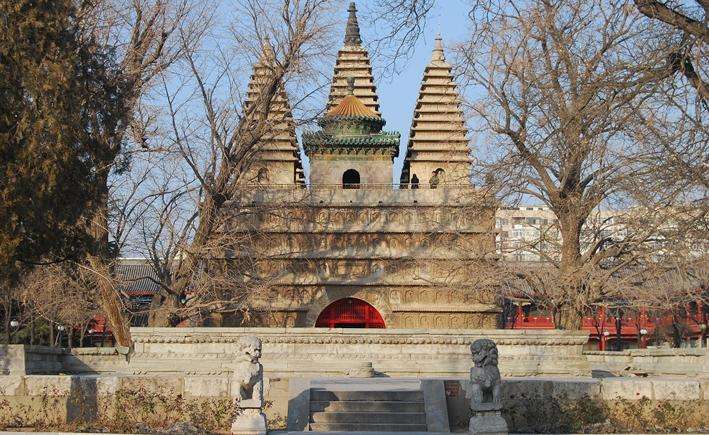
Yunju_Temple_And_Stone_Sutras.
Local Cuisine and Accommodation Nearby
When visiting the Yunju Temple and its surrounding Stone Sutras, you’ll find a delightful array of local cuisine and comfortable accommodations to enhance your experience. Nestled in the tranquil landscapes of the Fangshan District, this area is not only rich in history but also brimming with culinary delights and cozy places to stay.
Culinary Delights
-
Local Farmhouse Cuisine
Just a short stroll from the temple, you’ll discover several farmhouse restaurants offering authentic Chinese dishes. These establishments focus on fresh, locally-sourced ingredients, allowing travelers to savor traditional flavors. Signature dishes often include home-style stir-fried vegetables, deep-fried fish, and hearty noodle soups that reflect the region’s agricultural bounty. Expect a warm, rustic ambiance that complements the hearty meals. -
Reindeer Bay Private Hot Spring Inn
For a unique dining experience, consider visiting the Reindeer Bay Private Hot Spring Inn, located about 320 meters from the temple. This establishment blends a tropical atmosphere with local flavors. Enjoy meals prepared with fresh ingredients while surrounded by lush greenery, making it a perfect spot to unwind after a day of exploration. The inn also offers private hot spring baths for a soothing end to your day.
Accommodation Options
-
Reindeer Bay Private Hot Spring Inn
This charming inn is an excellent choice for those seeking a peaceful retreat. Featuring individually designed courtyards, each room comes with its own private hot spring, providing a relaxing escape amidst nature. The inn is pet-friendly, making it a suitable option for travelers with furry companions. Prices are reasonable, averaging around ¥300 per person, and the welcoming staff ensures a homely atmosphere. -
Farmstay Options
For travelers looking to immerse themselves in local culture, consider one of the nearby farmstays. These accommodations often provide a chance to interact with local families and learn about traditional farming practices. Enjoy homemade meals prepared by your hosts, often featuring fresh produce from their gardens. The serene environment and rustic charm make these farmstays an ideal choice for families and couples alike. -
Boutique Guesthouses
The area also hosts several boutique guesthouses that combine comfort with unique design. Many of these guesthouses are situated within walking distance of the Yunju Temple, allowing guests easy access to the site’s historical treasures. Expect modern amenities, cozy decor, and personalized service, ensuring a memorable stay.
Exploring Beyond the Temple
After visiting the Yunju Temple, take advantage of the beautiful surroundings to explore nearby natural attractions. The region is perfect for hiking and offers stunning views of the mountains and lush landscapes. Whether you choose to dine at local eateries or retreat to a charming inn, your visit to this historical site will be enriched by the flavors of the region and the comfort of its accommodations.
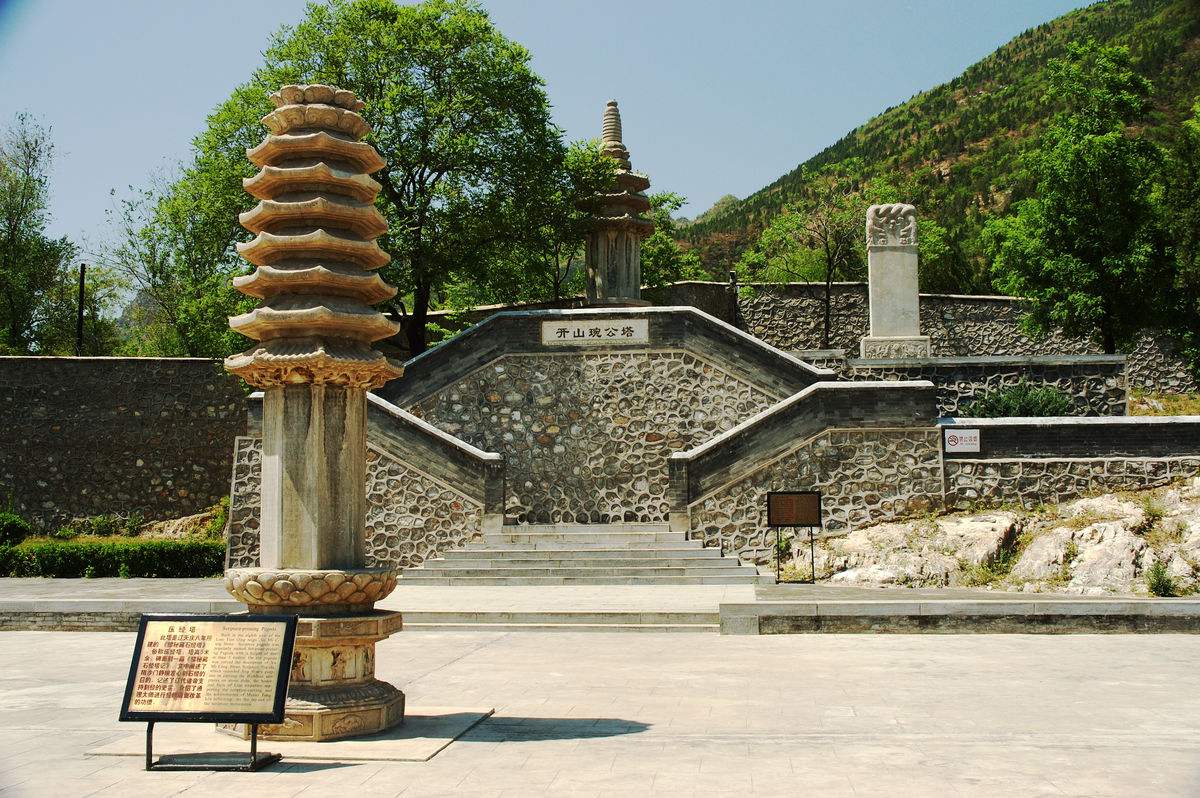
Yunju_Temple_And_Stone_Sutras.
Frequently Asked Questions
-
What are the opening hours for Yunju Temple?
Yunju Temple is open daily from 9:00 AM to 5:00 PM, with the last admission at 4:30 PM. Make sure to plan your visit accordingly! -
How much does it cost to enter Yunju Temple?
The entrance fee for adults is 40 CNY (approximately 6 USD). Admission is free for children under 18 and seniors aged 60 and above. -
How do I get to Yunju Temple from downtown Beijing?
Yunju Temple is located about 70 kilometers southwest of Beijing. You can take public transportation, such as bus routes 917 and F31, or drive, which typically takes around 1.5 hours depending on traffic. -
What are the must-see attractions within Yunju Temple?
Don’t miss the impressive Northern and Southern Towers, which showcase unique architectural styles. The Stone Sutra Caves with ancient stone inscriptions and the temple’s tranquil courtyards are also highlights worth exploring. -
Is there a guided tour available at the temple?
While guided tours are not explicitly mentioned, visitors often find local guides or can join group tours that provide insights into the temple’s rich history and cultural significance. -
Can I take photographs inside the temple?
Photography is allowed in most areas of Yunju Temple, but please refrain from using flash. Respect the sacred atmosphere and the privacy of other visitors. -
Are there any dining options available near Yunju Temple?
Yes, there are several local restaurants and eateries within a short walking distance where you can enjoy traditional Chinese cuisine. It’s advisable to ask locals for their recommendations! -
What should I wear when visiting Yunju Temple?
It’s best to wear comfortable clothing and shoes suitable for walking, as you’ll be exploring various temple grounds. Modest attire is recommended, respecting the cultural and spiritual significance of the site.
Final Thoughts on Your Trip
As you wrap up your visit to Yunju Temple and the Stone Sutras, take a moment to reflect on the profound history and serene beauty that envelops this remarkable site. Nestled in the tranquil hills of Fangshan, just a short drive from Beijing, this ancient temple complex is more than just a visual feast; it’s a repository of spiritual heritage and cultural significance.
Walking among the majestic pagodas and exploring the intricately carved stone scriptures, you find yourself connected to centuries of Buddhist tradition and craftsmanship. The echoes of prayers and the rustle of leaves create a peaceful ambiance that invites introspection and gratitude. Whether you wandered through the stunning halls, marveled at the intricate details of the stone sutras, or simply paused to enjoy the surrounding natural beauty, Yunju Temple offers a unique experience that resonates deeply with the soul.
Before you leave, consider visiting the nearby cultural market, where the charm of local craftsmanship awaits, inviting you to take a piece of this enchanting journey home with you. As you drive away, carry with you not just memories, but a sense of peace and inspiration fostered by the spiritual legacy of Yunju Temple. This is a place that speaks to the heart and mind, reminding us of the enduring power of faith, history, and human creativity. Safe travels and may your future adventures be as enriching and enlightening!